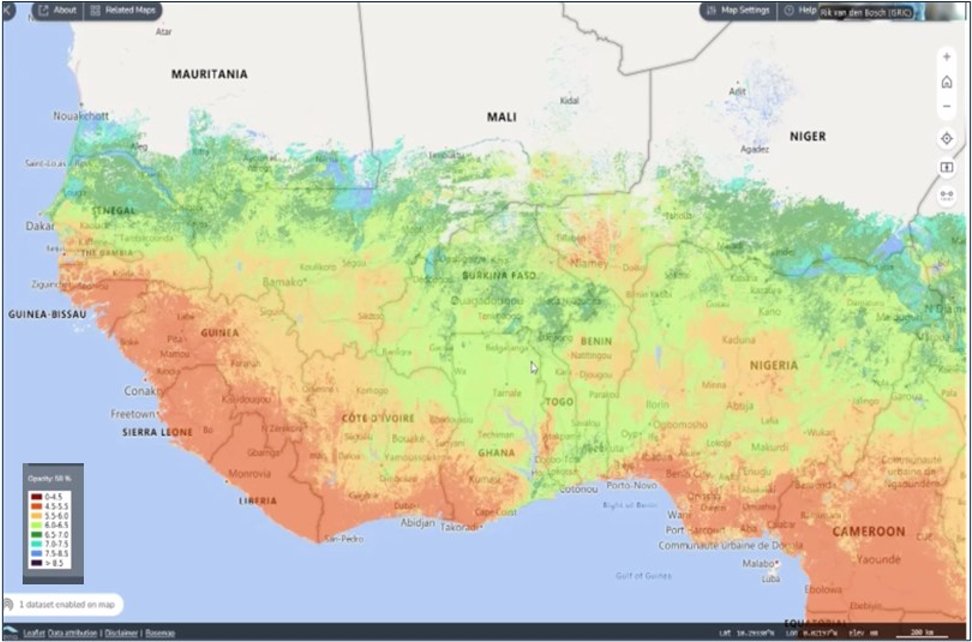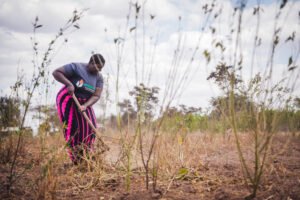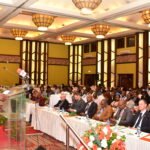By Zablon Oyugi, December 5, 2024, A digital soil health and fertility maps, a technological innovation aimed at revolutionising agriculture in the West Africa and the Sahel region is poised to bring a glimmer of hope to millions of smallholder farmers struggling with low yields and soil degradation, facing a looming threat of food insecurity.
This delicate balance of these communities had been further disrupted by climate change, which compounds the issue of poor soil health.
However, these cutting-edge tools offer precise, data-driven solutions to improve soil management, boost productivity, and enhance climate resilience.
By integrating vast datasets from soil samples, satellite imagery, and geospatial analysis, digital soil maps provide a comprehensive understanding of soil health across the region. This granular level of insight empowers farmers to make informed decisions, such as selecting appropriate crop varieties, optimizing planting schedules, and tailoring irrigation strategies to local conditions.
Tools like AgWise, which leverage these maps, deliver localized advice directly to farmers, enabling them to mitigate climate risks and increase their yields.
Beyond climate resilience, digital soil maps contribute to environmental sustainability by minimizing the overuse of fertilizers. By identifying specific nutrient deficiencies, farmers can apply precise amounts of fertilizer, reducing environmental harm such as soil acidification and water contamination. This precision farming approach promotes sustainable land management practices, preserving soil health for future generations.
Economic impact
The economic impact of digital soil maps is equally significant. By adopting data-driven practices, farmers can achieve yield increases of up to 40% and profit gains of 20%. This translates into improved livelihoods for individual farmers and, on a larger scale, reduced food import costs for nations, bolstering regional food security.
The development of digital soil maps relies on advanced technologies like artificial intelligence and machine learning, which analyze complex datasets to generate detailed and accurate maps. These tools are complemented by mobile apps and digital platforms that provide user-friendly access to soil data and recommendations for farmers and extension agents. Collaborative efforts between organizations like the International Soil Reference and Information Centre (ISRIC), iSDAsoil, and the Regional Hub for Fertilizer and Soil Health for West Africa and the Sahel (the Hub) contribute to the accuracy and reach of these maps.
While the potential of digital soil maps is immense, challenges remain, ensuring high-quality, standardized data collection and sharing is crucial. Unified databases and partnerships between governments, research institutions, and the private sector are essential to fill data gaps. Additionally, investments in digital infrastructure and capacity-building programs are necessary to enable stakeholders, from policymakers to farmers, to utilize these maps effectively.
Fertilizer and Soil Health
The African Union’s 10-Year Action Plan for Fertilizer and Soil Health recognizes the importance of multi-stakeholder partnerships to drive investments in soil management. The Hub’s strategy is framed by the priorities of the Fertilizer and Soil Health Roadmap 2023 and the Nairobi Declaration from the Africa Fertilizer and Soil Health Summit 2024.
“The release of improved digital soil maps is not just a technological breakthrough—it’s a testament to the collective resolve of governments, researchers, and farmers to transform agriculture in West Africa and the Sahel. Fertile soil is the foundation of food security, and these maps bring us closer to that goal,” says Bernard Vanlauwe, Deputy Director General, Research for Development at IITA and chair of the Hub consortium steering committee.
As the updated digital soil maps are set to launch in early 2025, the Regional Hub is actively working on expanding mapping efforts, enhancing data accuracy, and supporting the development and adoption of climate-smart agronomy tools like AgWise. A
gWise is a freely available, open-source tool that provides data-driven, localized, and climate-specific agronomic recommendations. It combines agronomic and geospatial datasets from field trials, market analyses, and open data sources to deliver tailored advice on optimal planting times, cultivar selection, fertilizer types and quantities, and good agronomic practices.
Supporting eight crops
Currently supporting eight crops, including cassava, maize, rice, potato, and wheat, in key African countries, AgWise integrates soil, weather, and satellite data from sources like ISRIC to contextualize recommendations for specific growing conditions. Designed to empower smallholder farmers, the platform offers actionable insights to improve productivity and profitability, while its open-source nature enables further development by the global agricultural community.
Governments, donors, and private-sector stakeholders have a crucial role to play in realizing the full potential of digital soil maps. By investing in digital infrastructure and capacity building, implementing policies that incentivize the use of these tools, and fostering regional collaboration, they can contribute to a future where West Africa and the Sahel achieve resilient, sustainable, and inclusive agricultural growth, ensuring food security and prosperity for generations to come.
“Agricultural productivity and soil resilience in West Africa and the Sahel aren’t just about food security—they are foundational to economic stability and climate resilience,” notes Vanlauwe.
As we approach the release of the new maps, the promise of data-driven agriculture in West Africa has never been more tangible.







